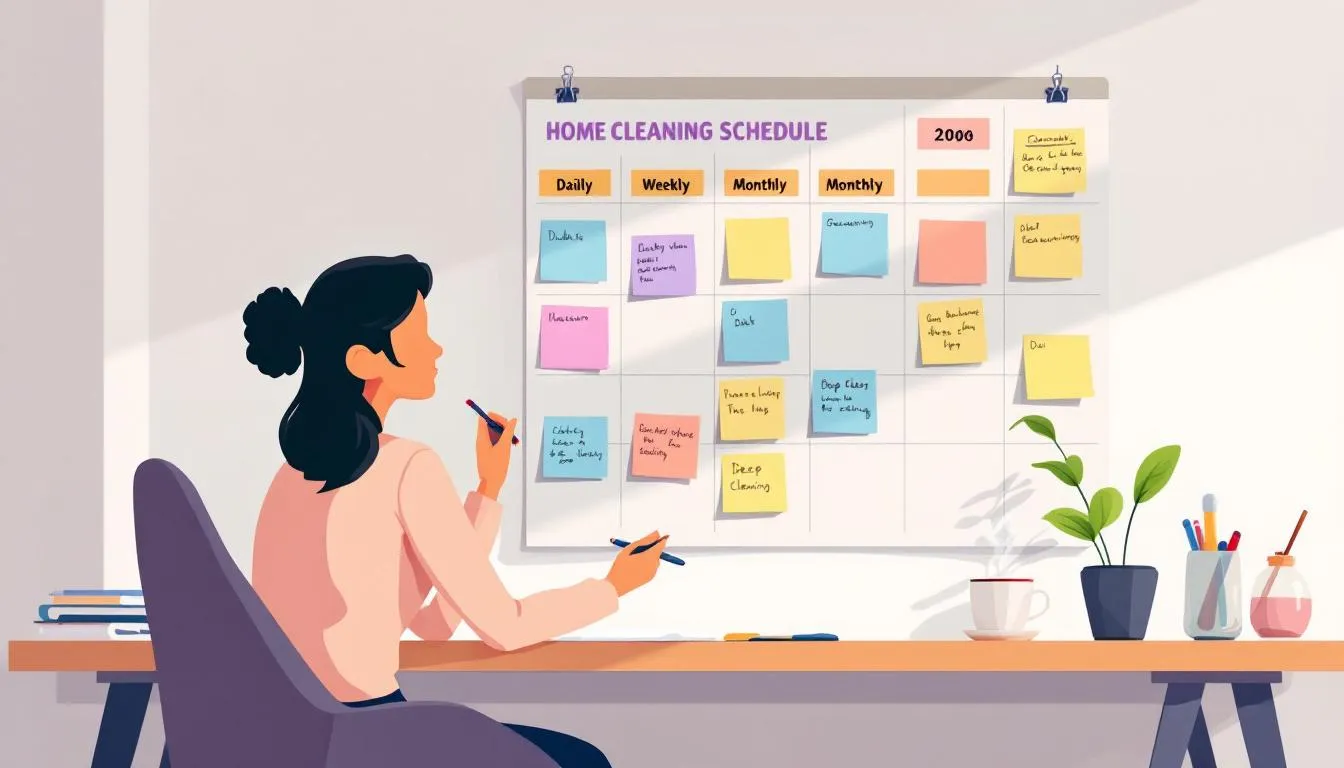Wondering how often you should get your house cleaned? The answer isn’t as simple as a one-size-fits-all solution. Your ideal cleaning frequency depends on several factors, including the size of your household, whether you have kids or pets, and your unique lifestyle. Finding the right balance can transform your living space into a spotless sanctuary without overwhelming your schedule or budget.
In this comprehensive guide, we’ll help you navigate the options, from weekly to monthly cleaning routines, so you can choose what works best for you. Whether you’re aiming for a consistently pristine home or a more relaxed approach, understanding these factors will empower you to create a cleaning schedule that keeps your space fresh, healthy, and inviting all year round.
Key Takeaways
- The cleaning frequency for your home should depend on household size, presence of kids or pets, and your personal lifestyle preferences.
- Weekly cleaning can keep your home consistently clean but may be time-consuming and costly, while fortnightly and monthly options offer a balance of cleanliness and affordability.
- Regular daily maintenance, like controlling clutter and managing high-traffic areas, is essential to minimise the need for deep cleaning and maintain a healthy living space.
Determining Your Ideal Cleaning Frequency

Finding the right house cleaning schedule requires a closer look at your household’s unique needs. Factors like the number of people living in your home, whether you have kids or pets, and your lifestyle and personal preferences all play a critical role. Understanding these elements allows you to create a cleaning routine that maintains a clean and stress-free home.
Here’s a break down of these factors to guide your decision.
Household Size
The size of your household is a significant determinant of how often you need to clean. Larger families tend to create more mess, requiring more frequent cleaning sessions to keep the house in order. High-traffic areas, like the living room and kitchen, can quickly become hotspots for dirt and clutter if left unattended.
Setting realistic expectations and ensuring your cleaning schedule fits both your home and your availability is crucial.
Children and Pets
Kids and pets bring joy to the family, but they also contribute significantly to household messes. From scattered toys to pet dander and food spills, maintaining a clean home can be more challenging.
Households with children and pets typically need more frequent cleaning to manage the constant dirt and grime, particularly in high-traffic areas such as the living room and bedrooms.
Lifestyle and Personal Preferences
Your lifestyle and personal preferences also influence your cleaning needs. If you entertain guests frequently or prefer a spotless home for your peace of mind, you might lean towards more frequent cleaning. Conversely, if your home is a sanctuary for relaxation and you don’t mind a bit of lived-in clutter, a less rigorous cleaning schedule might be sufficient.
The aim is to strike a balance that supports both your physical, mental well-being, and normal rest.
Weekly Cleaning: Pros and Cons
Weekly cleaning is a popular option for those who prioritise maintaining a consistently clean home. This schedule allows for regular upkeep, preventing the accumulation of dirt and grime. However, it’s essential to weigh the benefits and drawbacks to determine if this frequency aligns with your lifestyle and budget.
Here are the detailed pros and cons of weekly cleaning.
Pros
A weekly cleaning schedule ensures that your home remains spotless and inviting, making it ideal for busy families and individuals who want to avoid deep cleaning tasks piling up. Regular cleaning helps tackle daily messes, like food spills and dirty dishes, before they become overwhelming. It also keeps allergens like pet dander and dust mites at bay, contributing to a healthier living environment.
This routine is often crucial for completing a clean and organized home.
Cons
Despite its benefits, weekly cleaning can be more expensive and time-consuming for most people. The higher frequency of professional cleaning services might not fit everyone’s budget, and the regular disruption can be challenging for those with unpredictable routines.
Additionally, the commitment to a weekly schedule can be overwhelming for some, making it difficult to maintain consistently. Weighing these factors will help you decide if weekly cleaning suits your needs.
Fortnightly Cleaning: Pros and Cons
Fortnightly cleaning offers a middle ground between weekly and monthly schedules, providing a balance of cleanliness and cost-effectiveness. This option can be suitable for households that do not accumulate dirt as quickly but still need regular upkeep.
Here are the pros and cons of fortnightly cleaning to help you decide if it suits your needs.
Pros
Choosing a fortnightly cleaning schedule can be a cost-effective way to maintain a clean home without the constant upkeep required by weekly cleaning. This schedule allows enough time between cleanings for the home to stay tidy, while also preventing significant dirt build-up.
This schedule balances maintaining cleanliness and managing costs.
Cons
One downside of fortnightly cleaning is the potential for dirt to accumulate in high-traffic areas, making it less suitable for homes with kids or pets. Additionally, fortnightly services might still be more expensive than monthly options, which could be a concern for budget-conscious households.
Lastly, maintaining a certain level of tidiness between professional cleanings can be challenging, requiring a bit more effort from the homeowners.
Monthly Cleaning: Pros and Cons
Monthly cleaning is an option for those who want to keep their home clean without frequent disruption or high costs. This schedule is ideal for homes that are less frequently used or for individuals who prefer to manage daily tasks themselves.
Here are the pros and cons of monthly cleaning.
Pros
Opting for monthly cleaning can be more economical, particularly for households that do not require frequent cleaning. This schedule allows you to maintain a clean home without the constant expense and disruption of more frequent services.
Monthly cleanings can also provide thorough cleaning sessions that address deeper grime and dirt build-up.
Cons
However, monthly cleaning might lead to significant dirt and grime accumulation, necessitating more extensive cleaning efforts during each session. Homes with high-traffic areas or those with children and pets may find that monthly cleanings are insufficient to maintain a desirable level of cleanliness.
This schedule requires diligent daily upkeep to prevent overwhelming cleaning tasks.
Customising Your House Cleaning Schedule
Creating a personalised house cleaning schedule involves understanding your household’s unique needs and preferences. Assessing your cleaning needs and incorporating flexibility allows you to create a manageable plan for a clean home.
Here’s how to assess your needs and design a flexible cleaning plan.
Assessing Your Needs
Start by evaluating your household’s specific cleaning needs. Consider factors like the number of occupants, presence of pets, and high-traffic areas. Regularly reviewing your cleaning schedule ensures it remains effective and adaptable to changing demands.
Categorising cleaning tasks into daily, weekly, and occasional helps manage responsibilities without overwhelm.
Creating a Flexible Plan
An effective cleaning schedule relies on flexibility. Assign specific tasks to different days to avoid overwhelming weekends. Allow room for unexpected events and changes in routine, ensuring your cleaning plan remains practical and achievable.
This strategy helps maintain a clean and organized home with less stress.
Deep Cleaning Tasks
Deep cleaning tasks are essential for maintaining a truly clean home. These tasks go beyond regular cleaning, targeting areas that require more thorough attention. Essential deep cleaning tasks include scrubbing grout, washing windows, and steam cleaning carpets.
Here are specific deep cleaning tasks for various parts of your home.
Carpets and Floors
Carpet and floors require regular deep cleaning to maintain hygiene and appearance. At least once a year, carpets should be professionally cleaned to remove embedded dirt and allergens like dust mites and pet dander.
Regular spot cleaning in high-traffic areas can significantly reduce the need for deep cleaning later.
Kitchen and Bathroom Surfaces
Thoroughly cleaning kitchen and bathroom surfaces can significantly reduce the risk of food-borne illnesses and maintain hygiene. Using hot water and proper dish soap improves the cleaning efficiency for greasy or sticky dishes.
Regularly cleaning tile grout, hardwood floors, and upholstered furniture is also essential for maintaining a healthy living environment.
Windows and Light Fixtures
Cleaning windows and light fixtures enhances the brightness and appeal of your home. Regular maintenance of these areas contributes to a brighter and more inviting living space, improving the overall ambience, especially when you consider the view from the window.
This attention to detail can make a significant difference in the cleanliness and appearance of your home.
Daily Maintenance Tips
Daily maintenance is crucial for keeping your home consistently clean and reducing the need for frequent deep cleaning tasks. Establishing a daily cleaning routine can lower the frequency of illnesses by minimising the spread of germs on surfaces. Essential daily tasks include washing dishes, sanitising sinks, and tackling clutter.
Here are some specific tips for daily maintenance.
Dirty Dishes
Keeping up with dirty dishes is a daily task that can prevent grime build-up in your kitchen. Adopt simple habits like spending 5-10 minutes cleaning before and after work to manage daily tasks efficiently. You can also set aside time on Fridays to catch up on any missed tasks during the week.
Using hot water and soapy water ensures that dishes are thoroughly cleaned in the dishwasher, preventing bacteria and food debris from accumulating, and a final rinse can enhance the cleaning process.
Clutter Control
Daily clutter control helps maintain an organized and stress-free living environment. Set aside a little time each day to tackle clutter, focusing on high-traffic areas.
Dedicating specific time slots in your daily schedule for decluttering tasks ensures consistency and effective clutter control.
High Traffic Areas
High traffic areas are the most susceptible to dirt accumulation, making routine cleaning vital. To keep dirt at bay:
- Incorporate a quick morning clean-up of common areas such as hallways and living rooms.
- Use mats at entrances to catch dirt.
- Establish a no-shoes rule inside the home to help maintain cleanliness.
Consistent routines in high-traffic areas can lead to a cleaner home and reduce the need for frequent deep cleaning sessions.
Professional Cleaners: When to Hire
Sometimes, professional cleaners are necessary to achieve a spotless home. Busy households may find it advantageous to hire professional cleaners to maintain cleanliness and reduce stress.
Here are the signs that indicate you need professional help and tips on finding the right cleaning service.
Signs You Need Professional Help
Persistent messes, unpleasant odours, and visible mould or mildew are clear signs that professional intervention is necessary. These issues often indicate deeper problems that regular cleaning cannot address.
Professional cleaners can provide the thorough cleaning needed to eliminate these problems and restore your home’s cleanliness.
Finding the Right Service
Finding a reliable cleaning service can make all the difference in maintaining your home. Start by reading online reviews and testimonials from previous clients to ensure the service you choose is reputable and delivers quality results.
Additionally, consider factors like pricing, the use of environmentally friendly cleaning products, and the flexibility of their service offerings. This due diligence will help you decide on a service that aligns with your cleaning needs and budget.
Summary
In summary, determining the ideal cleaning frequency for your home involves considering household size, the presence of children and pets, and your lifestyle and preferences. Weekly, fortnightly, and monthly cleaning schedules each have their pros and cons, and the right choice depends on your specific needs. Daily maintenance and deep cleaning tasks play a crucial role in keeping your home spotless and healthy. When the cleaning becomes overwhelming, hiring professional cleaners can be a wise decision. By customising your house cleaning schedule, you can achieve a consistently clean home that supports your well-being and peace of mind. Take these insights, apply them to your routine, and enjoy the benefits of a cleaner, more organized living space.
Frequently Asked Questions
How often should I get my house cleaned if I have pets?
If you have pets, it’s best to clean your house weekly or every two weeks to keep pet dander and mess in check. Regular cleaning helps maintain a fresh environment for both you and your furry friends.
What are the benefits of hiring professional cleaners?
Hiring professional cleaners ensures a deep clean that tackles stubborn odours, dirt, and allergens effectively. It’s a great way to maintain a healthier and fresher home!
How can I maintain a clean home daily?
To keep your home clean daily, set a simple routine like washing dishes and tidying up clutter. This will help you stay on top of dirt and enjoy a healthier living space.
What are some essential deep cleaning tasks?
To really freshen up your home, focus on scrubbing grout, washing windows, and steam cleaning carpets. These deep cleaning tasks not only enhance hygiene but also make your space look great!
How do I find a reliable cleaning service?
To find a reliable cleaning service, check online reviews and testimonials, and make sure they use eco-friendly products. Also, look for flexible pricing options that suit your budget.






